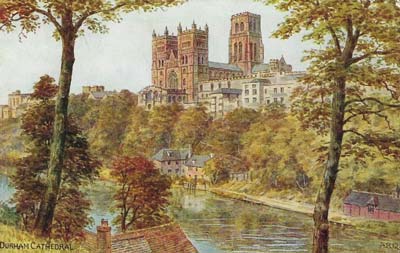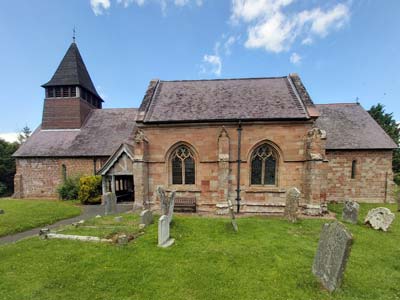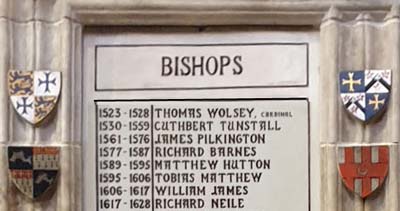Information regards Richard Barnes - Bishop of Durham
Richard Barnes (1532 – 24 August 1587) was an Anglican priest who served as a bishop in the Church of England during the reign of Elizabeth I.Early life, education and family
He was born in Bold which was then a village near St Helens in south Lancashire. He attended Farnworth Grammar School and then was admitted to Brasenose College, Oxford. Here he was elected a fellow in 1552, and received his BA in 1553. This was followed by a BD and then a postgraduate MA in 1557. Finally he became a DD in 1579.
Barnes was ordained a deacon on 24th September 1558 at St Bartholomew-the-Great by Peter Wall, Bishop of Clonmacnoise and a priest on 7th December by Edmund Bonner, Bishop of London at his manor's chapel. After receiving Holy Orders he was made Minister of Stonegrave in Yorkshire. In 1561 he was appointed Canon Chancellor (and canon of the Laughton prebend which was annexed thereto) of York Minster, which offices he held until 1571.
He married Fredesmund Gifford in the 1560s. Their daughter Mary was born about 1567; she married Richard Jocelyn of Hyde Hall in Sawbridgeworth. (Jocelyn was an ancestor of the Baronets Jocelyn of Hyde Hall, the Viscounts Jocelyn and the Earls of Roden by his second wife Joyce Atkinson.)
Episcopal careerIn 1567 he was appointed Bishop suffragan of Nottingham and later, in 1570, was appointed Bishop of Carlisle. As bishop, he soon gained a reputation as someone dedicated to seeking out recusants. In 1575 he was translated to Durham, as a result of the patronage of William Cecil, 1st Baron Burghley: his election to that See was confirmed on 9th May and he was enthroned at Durham Cathedral on 19 May. It seems that he was on bad terms with Edmund Grindal, then Archbishop of Canterbury. One possible reason for this is that Barnes disapproved of Grindal's refusal to suppress the prophesyings – which refusal had led to Grindal being suspended from office.
Titles
• 1532–1558: Richard Barnes Esq.
• 1558–1561: The Reverend Richard Barnes
• 1561–1567: The Reverend Canon Richard Barnes
• 1567–1579: The Right Reverend Richard Barnes
• 1579–1587: The Right Reverend Doctor Richard BarnesBishop of Nottingham 1567–1570
Bishop of Carlisle 1570–1575
Bishop of Durham 1575–1587
Part of the list of Bishops at Durham Cathedral.
1577 - 1587 Richard Barnes
BARNES, RICHARD (1532–1587), bishop of Durham, was son of John Barnes and Agnes Saunderson, his wife, and born at Bould, near Warrington, in Lancashire, 1532. At the parish school of Warrington Barnes doubtless received his first education. In 1552 he was 'elected a fellow of Brasenose College [Oxford] by the authority of the king's council.' He proceeded B.A. 1553, and M.A. 1557. Having received holy orders, he was presented to the small livings of Stonegrave and Stokesley, Yorkshire. On 12 July 1561 he was admitted chancellor of the church at York, and later became canon-residentiary and prebendary of Laughton in the same church (Le Neve's Fasti, iii. 165). He was also chosen public reader of divinity there. On 4 Jan. 1567 he was created suffragan-bishop of Nottingham (Le Neve, iii. 241; Pat. 9 Eliz. p. 11, m. 33). The consecration took place in the church of St. Peter at York by the archbishop (Sandys), assisted by the bishops of Durham (Pilkington) and Chester (Downman). He was elected to the see of Carlisle on 25 June 1570, and received the royal assent 13 July, the temporalities being restored to him on the 26th of the same month (Le Neve, iii. 241). By the influence of his patron, Burghley, the queen granted him 'a license to hold in commendam, with his bishopric, the chancellorship of York, the rectories of Stonegrave and Stokesley, and also the rectory of Romaldkirk, Yorkshire, as soon as it fell vacant.' He resigned the chancellorship in 1571 (Le Neve, iii. 165). On 5 April 1577 he was elected to the most splendid of all the sees, Durham, in succession to its first protestant bishop, Pilkington, who died 23 Jan. 1575–6. He obtained the royal assent on the 19th of the same month, the archbishop's confirmation on 9 May following, and the temporalities on the 29th of same month (Le Neve, iii. 294). Burghley was responsible for this appointment, and in a letter to him dated 23 March 1576 Barnes writes: 'Your lordship was mine only preferrer to Carlell, where I have served my seven years, and I trust discharged the promise yee then made unto her highness on my behalf, which in this poore and bare living was all that I could do; now by your means being preferred to a better, if in time I be not thankful. …' Barnes's gratitude took the shape of delivering up (practically) to the crown, a long string of 'Manores' belonging to the see. Barnes has been severely blamed for this compliance; but it is doubtful if, in any single case, bishopric or other dignity ever was then presented under any other conditions (Strype, ii. App. 65). Bishop Pilkington had neglected his great diocese, and Barnes, writing to his patron, describes his see as 'this Augiæ stabulum, the church of Durham … whose stinke is grievous in the nose of God and men, and which to purge far passeth Hercules labours.' It is important, with reference to the charges afterwards brought against Barnes, to continue the quotation. 'The malicious of the county are remarkably exasperated against me; and whereas at home they dare neither by words nor deeds deal undutifully against me, yet abroad they deface me by all slanders, false reports, and shameless lyes; though the same be never so inartificial or incredible, according to the northern guise, which is never to be ashamed, however they bely and deface him whom they hate, yea, though it be before the humblest' (Strype, ii. 482–3).
Barnes has been accused of acting rapaciously, with the help of his brother John, chancellor in his court. But John was not his chancellor, and his 'Clavis Ecclesiastica,' an elaborate account of all the livings in the province of York, remains to show that his diocese was admirably administered. His own naturally unworldly temperament doubtless exposed him to being 'preyed upon' by those who served him; and that, combined with his enforced dispute about 'dilapidations' with Bishop Pilkington's widow, his quarrels with Archbishop Grindal, and his generous protection of the puritans, made him many enemies. A full and candid examination of the facts, however, leaves Bishop Barnes beyond most of his age—as he was early called—'learned, affable, and generous;' and if at times over-indulgent to offenders, pecuniarily and otherwise, the magnanimous weakness was a 'failing' that 'leaned to virtue's side.' His humility and clemency are well illustrated by a story in the life of Bernard Gilpin, in Brook's 'Lives of the Puritans' (i. 256–8). We are there told how Gilpin, who was an energetic preacher in the wild border-country, was ordered to preach before Barnes, and boldly denounced him for his want of due severity. The bishop went home with Gilpin, and said to him, 'Father Gilpin, I acknowledge you are fitter to be the bishop of Durham than I am to be the parson of your church. I ask forgiveness of past injuries. Forgive me, father. I know you have enemies, but while I live bishop of Durham, be secure; none of them shall cause you any further trouble' (cf. Carleton's and Gilpin's Lives of Bernard Gilpin).
In 1578 Barnes was on a commission for the visitation of the church of Durham. In February 1579 he was created D.D. at Oxford, having taken the degree of B.D. at Cambridge. On 24 May 1580, the queen commissioned him, Lord Hunsdon, and others to proceed to the borders of Scotland for 'redress of grievances.'
Barnes died on 24 Aug. 1587, and was buried in the choir of his cathedral. The dean of Durham (Dr. Toby Matthew) preached his funeral sermon on 7 Sept., from Psalm ciii. 15, 16. The following epitaph is still to be read on his tomb:—
Reverendo in Christo patri ac domino, dom. Richardo Barnes, Dunelmi episcopo, præsuli prædocto, liberali, et munifico, P.S. præclarissimo patri P.P.P. Obiit xxiv. Augusti, A.D. 1587, ætatis suæ 55. Mors mihi lucrum.
Astra tenent animam, corpusque hoc marmore clausum;
Fama polos penetrat; nomen nati atque nepotes
Conservant; vivit semper post funera virtus.
Barnes married first Fredesmund, daughter of Ralph Gifford, of Claydon, Bucks, by whom he had issue five sons and four daughters. The third son was Barnabe Barnes, the poet of 'Parthenophil and Parthenophe' [see Barnes, Barnabe]. Barnes married secondly, in 1582, Jane, a French lady, by whom he had no issue; after his death she became the wife of Dr. Leonard Pilkington, master of St. John's College, Cambridge. His 'Injunctions and other Ecclesiastical Proceedings' were edited by J. Raine for the Surtees Society in 1850.
©peh



